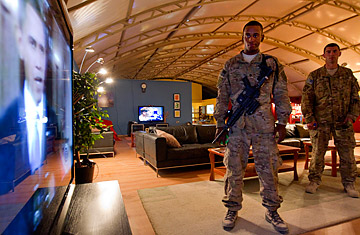
Spc. Gavin Fruge watches a rebroadcast of President Barack Obama's speech on proposed troop withdrawal with fellow soldiers at Kandahar Airfield Thursday, June 23, 2011 in Kandahar, Afghanistan.
(2 of 2)
Though Obama alluded to fears that a withdrawal risks losing the gains that have been made through the surge, Mir warns that the possible removal of significant numbers of troops from the war ravaged south will have a strong adverse effect on security. "I don't know from where the troops will be withdrawn, but if it is from Kandahar and Helmand provinces, it will certainly pose a big challenge for Afghan security forces and will turn back the gains that have been made." Members of the International Security Assistance Force contacted in Kabul were unable to give any details on from where the 10,000 troops would be withdrawn, but speculated that it would be from around the country, and not from one region.
Fears that a troop withdrawal will lead to instability have deep roots in Afghanistan. Lashkar Gah, the capital of Helmand Province — the scene of some of the heaviest fighting of the war — will be one of the first cities to see a security transition planned for July from foreign military forces to Afghan security forces. There, Afghan forces already provide the majority of security in the town, and locals are happy with the stability afforded by their protection. The population of the city has grown steadily as people from surrounding districts have moved there to escape the fighting. Even so, locals continue to fear the future.
"The Afghan National Security forces are not 100% ready for the transition. I would say they are 25% ready. In my own view they are not ready," a doctor in the city who wished to remain anonymous because of security fears, tells TIME. "Some people are concerned that everything will be like it was 10-15 years ago before the Taliban, during the time of the civil war. They are afraid there will be some internal fighting and some fighting between commanders," he says. "In the short term the Afghan security forces are good. But in the long term, there will most likely be problems." Though he added that he is content with the current situation within the city, he said that many patients coming in from the surrounding countryside of deserts and farms have told him that if foreign forces leave they expect to have problems.
These fears are supported by the widely acknowledged shortcomings of the Afghan police and army. "Before a withdrawal begins there is a need to equip the army and police with suitable weapons," Fabrizio Foschini, an analyst with Afghan Analysts Network, tells TIME. "And this is only part of the story. They face many other problems such as low morale and poor leadership." Other experts cite corruption and high attrition rates as among the most insurmountable problems facing the national security forces.
Back in Lashkar Gah, though there is peace for now, the doctor finishes the conversation by adding, "We are worried about the situation, we have been worried and we will continue to be worried about it."
